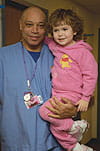The Division of Pediatric Gastroenterology is recognized for excellence in both clinical care and research. The department’s commitment to and clinical participation in the small bowel transplant program continues to enhance the transplant program’s success.
The Pediatric Surgery Department at Children’s Hospital of Pittsburgh is one of the largest and most recognized pediatric surgical programs in the country. It consists of fully trained, board-certified or board-eligible surgeons who are devoted exclusively to the care of surgical problems in infants and children. The Pediatric Surgery department offers a full spectrum of care for the range of intestinal surgical problems from common conditions in childhood to the very sophisticated that require tertiary complex intervention and management. The group is recognized for expertise in surgical infection, surgical critical care and the management of children with short bowel syndrome.
Nutrition Support
The Nutrition Support Team monitors, supports and advises staff on the nutritional management of all patients on parenteral nutrition (PN). The ability to feed patients intravenously is an established therapeutic modality to which many patients, especially those with intestinal diseases and abnormalities, owe their lives. The nutrition support team helps patients to manage PN through a disciplined and organized application of the methods of assessing nutritional requirements, the knowledge of available nutrients, the modes of administration and the potential complications.
Database Registry
As part of the initial evaluation process of any new patient, database registry forms are completed at or near the date of the first visit. Registry information includes a physical assessment by systems, patient demographics, intestinal characteristics, baseline and follow-up nutritional information and transplant data. The registry was designed as a means to identify the clinical characteristics of patients being followed, assess clinical outcomes and evaluate the long-term medical and nutritional management issues in children with intestinal disease.
Pediatric Infectious Diseases
The Infectious Diseases Division has developed prophylactic and treatment regimens for the liver/small bowel transplant programs and has conducted academic and applied research in infection control, the mechanisms and epidemiology of antibiotic resistance, xenotransplantation, neonatal infections and the use of new antimicrobials.
Pediatric Radiology
The Department of Pediatric Radiology offers complete imaging and intervention services. All imaging modalities are available, including general diagnostic radiology, body imaging, neuroradiology, nuclear imaging and angiography/intervention radiology.
The interventionists provide a full range of diagnostic and therapeutic services. Both vascular and non-vascular intervention services, including image-guided biopsy, abscess drainage, gastrostomy and other feeding techniques are available.
Using advanced imaging techniques, Children’s radiologists can identify problems and work closely with the child’s primary care physician to develop a care plan. The radiology team at Children’s is trained through fellowships in pediatric radiology and represent a broad background in pediatric diseases.
The Transplant Program
The pediatric transplant program at Children’s Hospital of Pittsburgh is internationally recognized for its leadership in organ transplantation. It is the nation’s first multi-organ transplant program and one of the world’s largest and busiest transplant centers. The transplant program began in 1981. Its mission is to provide innovative, state-of-the-art care to all transplant candidates, including extremely ill children referred from other institutions.
Since 1990, the transplant team has established pediatric liver/small intestine transplantation as a successful option in the care of patients with intestinal failure. Combining innovative approaches with compassionate care, the team has translated research in immunology, surgical technique and infectious disease into practical benefits for patients worldwide.









